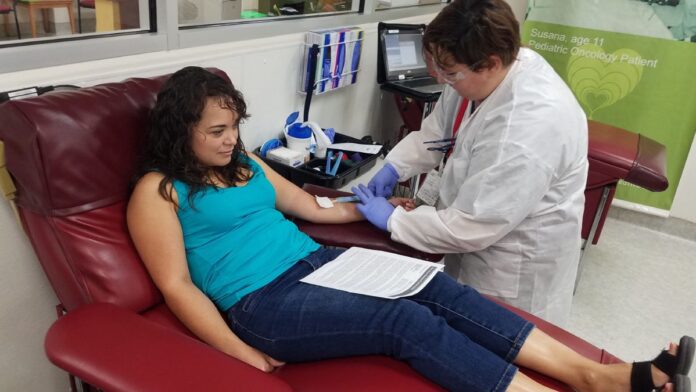McALLEN — Local blood providers began testing donors for the Zika virus this week as health officials say they anticipate the first homegrown cases to be confirmed.
United Blood Services is beginning Zika testing on people who have recently traveled to Mexico, the Caribbean or other areas where Zika is present as part of its annual Christmas in July blood drive.
“The testing program may have begun just in time, as public health officials caution that the U.S. could experience its first mosquito-transmitted cases of Zika in the coming weeks,” reads a Tuesday news release from the United Blood Services.
Health officials in Florida are currently investigating a case in the Miami area that could be the first transmission of the virus from a mosquito bite in the continental United States.
Frank Esparza, regional director of field operations at United Blood Services, said the center will be using a test that is under a new drug protocol because there is no FDA-approved donor testing method currently available. The testing will be done in corporate reference labs in Arizona or Florida.
“The FDA works really slowly, and it’s a complicated process,” Esparza said, “When we are dealing with virus and transmissions, there are a lot of decisions that have to be made.”
Since the first Zika case was diagnosed in Reynosa back in January the center has been turning away about 15 to 20 percent of its donors because they had recently traveled to Mexico or another country where the virus is widespread.
“The Valley is affected because we are a border town and any regions with a center close to the border are affected because people go down to Progreso just to have dinner, or buy tortillas, or avocados, and as long as they step into the Mexican side they are disqualified,” Esparza said.
If you travel to an endemic country, you have to wait approximately 28 days before making a donation, but with the new testing you won’t have to.
“This is the way it’s going to work; if they’re negative, all is good, but if they get tested and the unit comes out positive, they are deferred for 56 days. That’s eight weeks before they can make another donation,” Esparza said.
Zika is a mosquito-borne disease predominant in tropical areas. However, it can also spread through the last stages of a woman’s pregnancy, sex and blood transfusions. Perinatal transmission of the disease is a health hazard that drastically affects the future life of a fetus.
“The disease itself is not a risk — it’s like if you get the flu,” Esparza said. “The problem is if someone who is pregnant or is going to get pregnant gets it, then there could be a big challenge to the fetus. They’d have microcephaly, which is an abnormal brain disorder.”
The new testing will be paid for by the United Blood Services, a non-profit blood provider that has operated in the Valley for more than 50 years and serves patients in more than 16 hospitals.
Zika testing will be done only for those who have recently traveled to endemic countries until a home-grown case is confirmed. Then, testing will be done for all blood donors, according to Esparza.
United Blood Services will be hosting its first Zika relief blood drive starting Friday at La Plaza Mall. Volunteer blood donors must be at least 16, weigh a minimum of 110 pounds and be in good health. For more information, visit unitedbloodservices.org or call (956) 213-7512.
IF YOU GO
WHAT: Zika Relief blood drive
WHEN: 2 to 7 p.m. Friday and Saturday; Noon to 5 p.m., Sunday
WHERE: La Plaza Mall — JCPenney court




